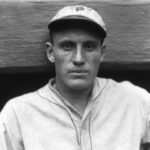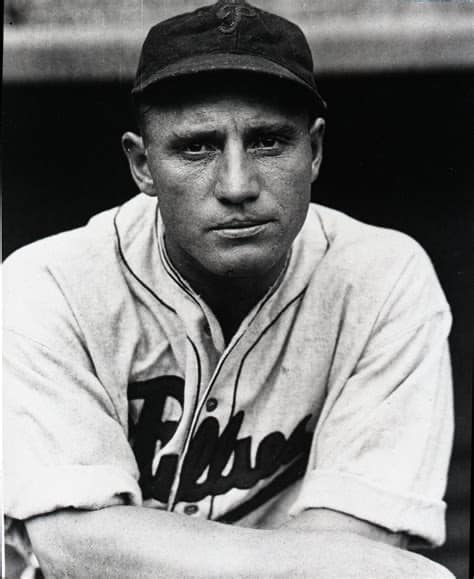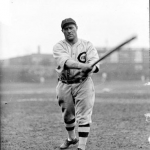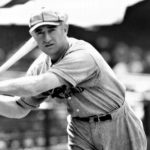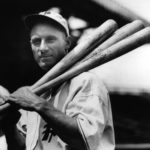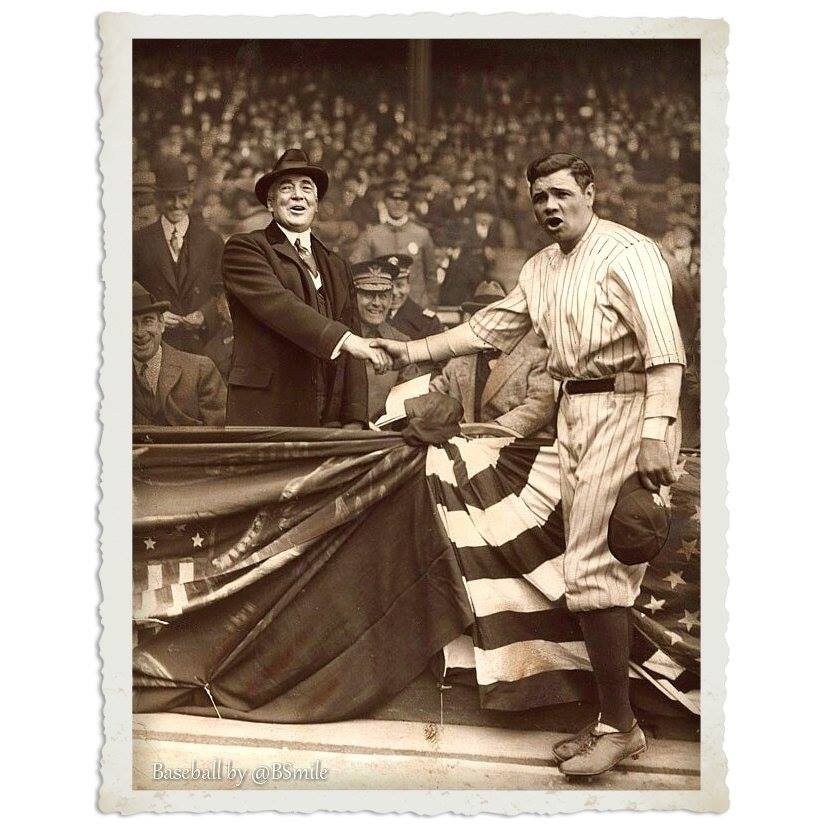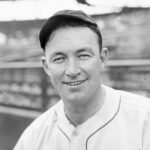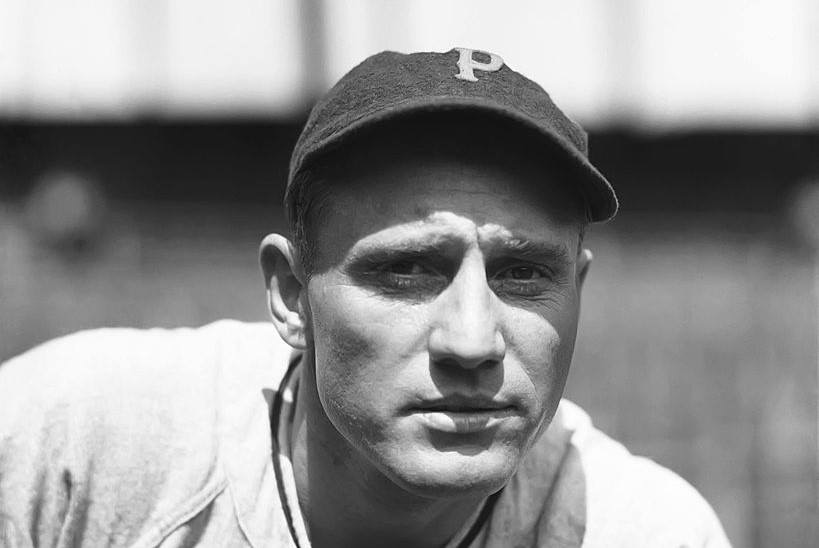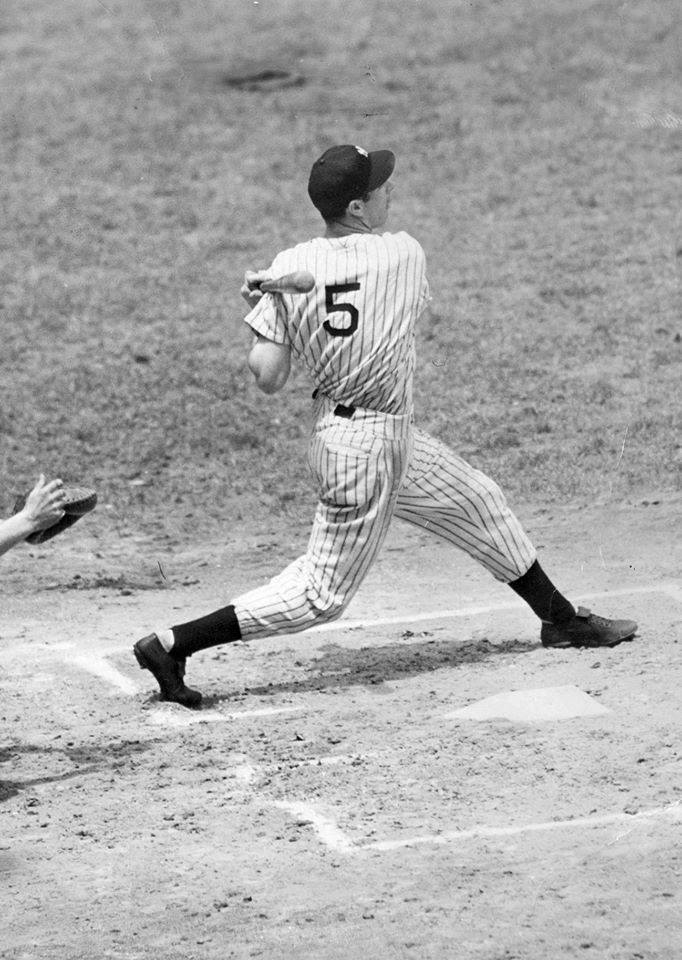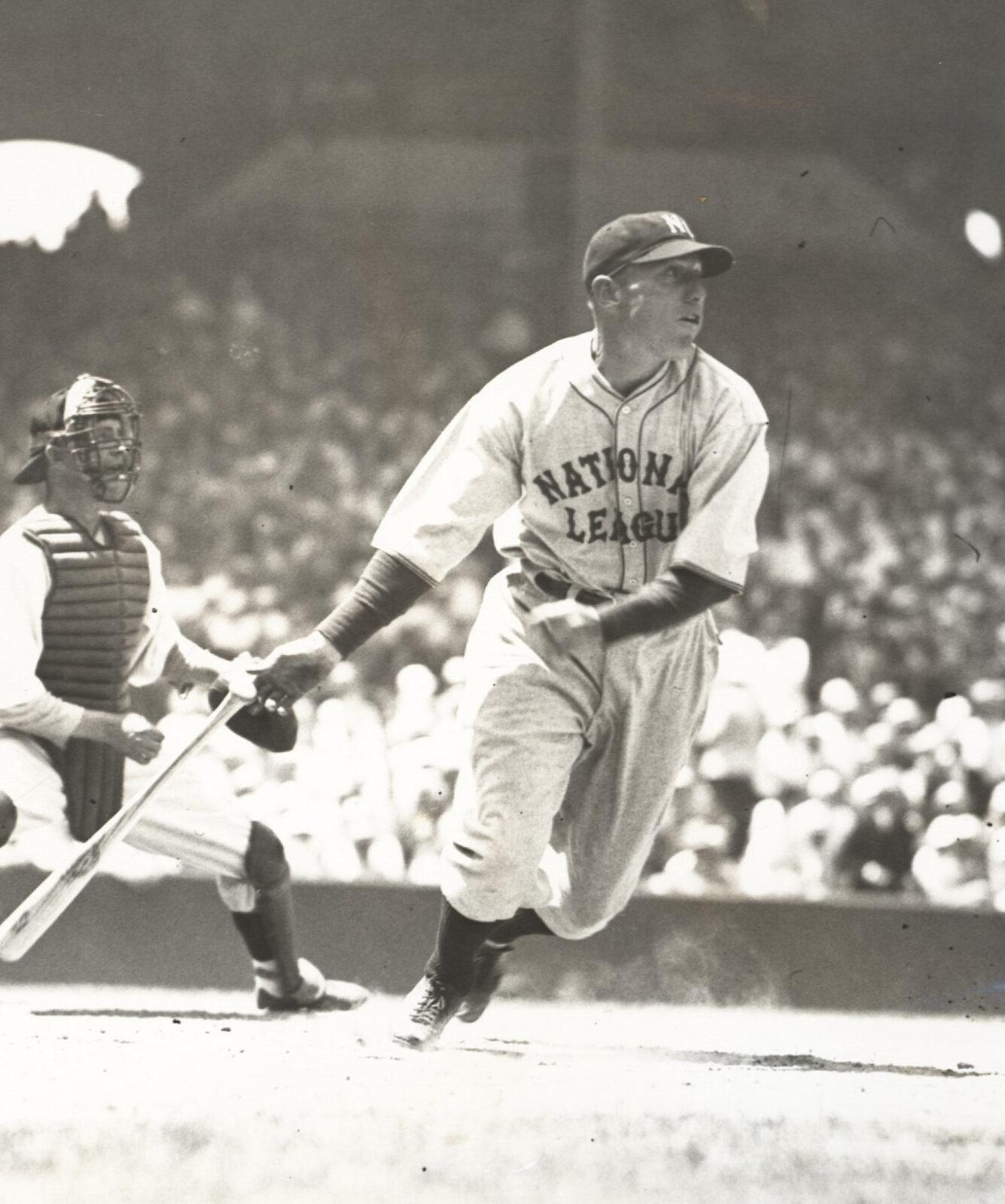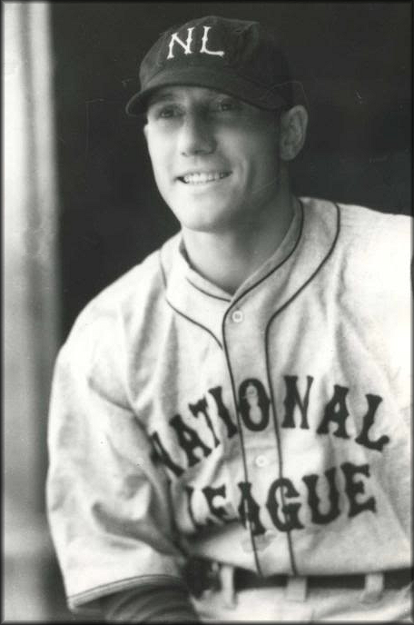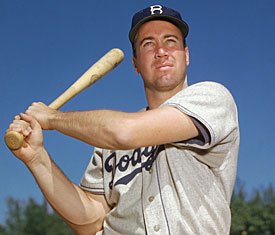Chuck Klein Stats and Facts
Chuck Klein
Position: Rightfielder
Bats: Left • Throws: Right
6-0, 185lb (183cm, 83kg)
Born: October 7, 1904 in Indianapolis, IN
Died: March 28, 1958 in Indianapolis, IN
Buried: St. Joseph Cemetery, Indianapolis, IN
High School: Southport HS (Indianapolis, IN)
Debut: July 30, 1928 (5,891st in MLB history)
vs. STL 1 AB, 0 H, 0 HR, 0 RBI, 0 SB
Last Game: June 11, 1944
vs. NYG 1 AB, 1 H, 0 HR, 0 RBI, 0 SB
Hall of Fame: Inducted as Player in 1980. (Voted by Veteran’s Committee)
View Chuck Klein’s Page at the Baseball Hall of Fame (plaque, photos, videos).
Full Name: Charles Herbert Klein
View Player Bio from the SABR BioProjec
Nine Players Who Debuted in 1928
Al Lopez
Bill Dickey
Chuck Klein
Rollie Hemsley
Pepper Martin
Mel Harder
Carl Hubbell
George Earnshaw
Clint Brown
All-Time Teammate Team
Coming Soon
Notable Events and Chronology for Chuck Klein Career
Chuck Klein was known as the “Hoosier Hammer” and played 17 years for the Philadelphia Phillies (1928-33, 1936-39, 1940-44), Chicago Cubs (1934-36) and Pittsburgh Pirates (1939). Also known as a hard worker and hustler, as well as a consistent slugger, Klein claimed four homerun championships, two RBI titles, a triple crown, two All Star assignments, an MVP trophy and election the National Baseball Hall of Fame. Klein was the top hitter in Phillies’ history until the arrival of Hall of Famer Mike Schmidt, and one of the few bright spots on an otherwise dreadful team.
Charles Herbert Klein was born near Southport, Indiana, where he was a star athlete at Southport High School. He worked briefly on a construction road gang, then in a steel mill. There, he built up his 6′, 185-pound frame by tossing 200-pound ingots about.
He also played semi-pro ball into 1927, when he was seen by a St. Louis scout and signed to a minor league contract with Evansville of the Three I League. However, a broken leg threatened to end his career after only 14 games. Klein returned in ’28 to belt 26 homers in the first 88 games he played for Fort Wayne of the Central League. In mid-season, while hitting .331, his contract was purchased for $7,500 by the Philadelphia Phillies, which outbid the New York Yankees. In 64 games with the Phillies in 1928 Klein showed major league potential by hitting .360.
As a sophomore in 1929, Klein hit .356 and topped the National League with 43 home runs, a new NL record.
Over the next five seasons, Klein’s offensive statistics were among the most outstanding in baseball history. He led the National League in eighteen offensive categories. During that span he averaged .359, along with 36 home runs per year, 139 runs batted in, 132 runs scored, 224 hits, and a slugging percentage of .636.
Klein’s ability as a base runner helped him to establish many of his NL records during those years, including most runs scored (158) and most extra base hits (107). His 445 total bases in 1930 remained the most by any National League left-handed hitter almost seven decades later. He led the leagues in steals in 1932.
Hoping to increase offense, the major leagues introduced a new, very tightly wound “live” baseball with less prominent seams in 1930. Hitters loved the new ball. Pitchers loathed it. It is widely acknowledged that 1930 was one of the greatest offensive seasons ever. Six of the eight National League teams had team batting averages over .300. The other two teams hit .281 apiece. The league as a whole batted .303. National Leaguers swatted 892 home runs and scored 7,025 runs, both new records.
Bill Terry of the Giants became the league’s last .400 hitter, and Hack Wilson of the Cubs set the major-league record of 191 RBI.
The 1930 Phillies were absolutely awful, going 52-102 and finishing in last place in the National League, 40 games behind the St Louis Cardinals. But, at age 25, their right fielder hit .386 with 40 home runs and 59 doubles. He drove in 170. He led the NL in doubles and was second in home runs and RBIs. Neither the NL or the AL selected an MVP in 1930 — Klein would finish second in 1931 and 1933 and win the award in 1932.
Klein batted safely in 135 of 156 games in 1930, a major-league record he shares with four other hitters (most recently Ichiro Suzuki in 2001). In one stretch, he got a hit in 71 of 75 games. He had four hits in a game seven times; three hits 18 times, and two hits 58 times. That’s 83 multi-hit games in 156 games played, a remarkable number. Of those multi-hit games, 48 came at home, where he was held hitless only five times in 77 games.
The 1930 National League batting race was one of the hottest on record. In mid-May, Klein reeled off a 26-game hitting streak during which he hit .486 (53-for-109) and raised his average to .426 before cooling off a bit. After a modest 14-game hitting streak that began in late June, Klein launched another 26-game streak on July 12. After one of his few cold spells, Klein engineered a final 14- game streak that pushed him close to the leader, but Bill Terry finished strong to take the title.
In 1931, Klein hit for the cycle in a game in which there was a triple play; which would not happen again for 65 years. In ‘31, Babe Ruth was the fourth-highest batter according to Sports Business Journal’s salary rankings, following Gehrig, Ted Williams and Chuck Klein.
In 1932, Klein led the league in stolen bases and came in third in triples with 15. He was the last player to lead in homers and steals in the same season, when he paced the National League with 38 and 20, respectively. Jimmy Sheckard and Hall of Famer Ty Cobb are the only other players to do so in the majors. The same year, Klein (226-38-20) became the second player in major league history to record a 200-20-20 season. The only other player in Phils history to reach the feat was Jimmy Rollins (212-30-41) in his MVP season of 2007. ‘
Along with his batting prowess, strong right-armed Klein was also an outstanding defensive right fielder who still holds the modern single-season mark with 44 assists in 1930. His league-leading numbers of outfield assists in 1930, 1932, and 1933 were largely a product of his skill at fielding the quirky ricochets and caroms off the composite, corrugated tin-covered wall at Baker Bowl.
There is no doubt that the Baker Bowl helped Klein’s offensive cause, with the ballpark’s high tin fence only 280 feet from home plate in right field. In 326 at bats, Chuck Klein hit .439 at home, over 100 points higher than on the road, which was still a quite respectable .332. He had over 100 RBIs in his home stadium, but still had 61 on the road. There were only five games that 1930 season that Chuck Klein failed to get a hit at home. Chuck Klein had 83 multi-hit games; 48 at the cozy Baker Bowl
1933. On July 6 of that year, he became the first Phil ever to bat in an All Star game, the first game. He was selected to the team the following year, as well.
The financially challenged Phillies sent Klein to the Chicago Cubs in November 1933 for three journeymen and $65,000, a huge number at the time. An historic, offensively explosive era was coming to a close, league wide.
Now also known as the “Clouting Kraut”, Klein found himself in a bigger park, though by no means a pitcher’s park. For Chicago, Klein played just 115 games in 1934 (.301) and 119 in 1935 (.293), and though decent numbers, they did not come close to expectations from Cub fans. Klein never duplicated his high quality of play with the Phillies, although he still led several defensive categories each year. In the 1935 World Series, which the Cubs lost in six games to the Detroit Tigers, he hit .333, with one homer.
With the Cubs, Klein began to experience a series of debilitating minor injuries, often hamstring pulls, one form of the “charley horse”. Many believe that Klein’s drinking began to affect his performance from the mid-1930s. In later years, Klein admitted to having felt intense pressure to produce as the Cubs’ “next great slugger”. Klein had thrived in the friendly, low-pressure atmosphere of Philadelphia. Fans of the lowly Phillies had one reason to go to the park, Chuck Klein.
The Phillies reacquired him in May 1936, where he experienced his last great season, scoring and driving in more than 100 runs for the sixth and final time. A few weeks after his return, he hit four home runs in a game — not at the cozy Baker Bowl but at Pittsburgh’s spacious Forbes Field where only one player, Babe Ruth, had previously hit as many as three in game. With the barrage, Klein joined an exclusive group of sluggers – including Lou Gehrig, Willie Mays, and Mike Schmidt – to hit four home runs in a single game.
For the last five years of his career, he was a part-time player, often used as a pinch-hitter. Klein’s career faded with a short tour in Pittsburgh in 1939, then a return to the Phillies. Playing only a handful of games since 1940, he retired, soon after getting one hit in seven at-bats, on June 11, 1944. He continued to coach for the Phillies from 1942 through 1945.
Only two men in the history of major league baseball have reached 400 total bases in a season three times. One of them, Lou Gehrig, did it five times, and the other is Chuck Klein. With the numbers, context, and public sentiment behind him, Chuck Klein won the HOF Veteran’s Committee vote in 1980, and entered the Hall of Fame. The Phillies, rather than retire one of the several numbers he’d worn for them, retired a “P” in his name, as they had for pre-numbers legend, Grover Cleveland Alexander.
Following his baseball days, Klein owned and managed a bar in the working-class neighborhood of Kensington in Philadelphia. His drinking habit had impaired his overall health, and in 1948, he was diagnosed with cancer, and soon suffered a stroke that damaged his nervous system and left one leg paralyzed. He moved to Indianapolis in 1947 to live with close relatives. He died there of a cerebral hemorrhage on March 28th, 1958, at the age of 53.
@ET-DC@eyJkeW5hbWljIjp0cnVlLCJjb250ZW50IjoicG9zdF90YWdzIiwic2V0dGluZ3MiOnsiYmVmb3JlIjoiTGVhcm4gTW9yZSBhYm91dCB0aGUgdGVhbXMsIHBsYXllcnMsIGJhbGwgcGFya3MgYW5kIGV2ZW50cyB0aGF0IGhhcHBlbmVkIG9uIHRoaXMgZGF0ZSBpbiBoaXN0b3J5IC0gLSAtIC0gLSAtIC0gIiwiYWZ0ZXIiOiIiLCJsaW5rX3RvX3Rlcm1fcGFnZSI6Im9uIiwic2VwYXJhdG9yIjoiIHwgIiwiY2F0ZWdvcnlfdHlwZSI6InBvc3RfdGFnIn19@
Factoids, Quotes, Milestones and Odd Facts
Coming soon
Other Resources & Links
Coming Soon
If you would like to add a link or add information for player pages, please contact us here.


